Notes used to present a Zoom lesson during the summer of 2020.
“Let the Lord look on you and judge, because you have made us abhorrent in the sight of Pharaoh and in the sight of his servants, to put a sword in their hand to kill us.” Exodus 5:21
“Because there were no graves in Egypt, have you taken us away to die in the wilderness? Why have you so dealt with us, to bring us up out of Egypt? Is this not the word that we told you in Egypt, saying, ‘Let us alone that we may serve the Egyptians’? For it would have been better for us to serve the Egyptians than that we should die in the wilderness.” Exodus 14:11-12
“What shall we drink?” Exodus 15:24
“Oh, that we had died by the hand of the Lord in the land of Egypt, when we sat by the pots of meat and when we ate bread to the full! For you have brought us out into this wilderness to kill this whole assembly with hunger.” Exodus 16:3
“Why is it you have brought us up out of Egypt, to kill us and our children and our livestock with thirst?” Exodus 17:3
“Come, make us gods that shall go before us; for as for this Moses, the man who brought us up out of the land of Egypt, we do not know what has become of him.” Exodus 32:1
“Who will give us meat to eat? We remember the fish which we ate freely in Egypt, the cucumbers, the melons, the leeks, the onions, and the garlic; but now our whole being is dried up; there is nothing at all except this manna before our eyes!” Numbers 11:4-6
“Has the Lord indeed spoken only through Moses? Has He not spoken through us also?” Numbers 12:2
“If only we had died in the land of Egypt! Or if only we had died in this wilderness! Why has the Lord brought us to this land to fall by the sword, that our wives and children should become victims? Would it not be better for us to return to Egypt?” Numbers 14:2-3
“Let us select a leader and return to Egypt.” Numbers 14:4
“You take too much upon yourselves, for all the congregation is holy, every one of them, and the Lord is among them. Why then do you exalt yourselves above the assembly of the Lord?” Numbers 16:3
“You have killed the people of the Lord.” Numbers 16:41
“If only we had died when our brethren died before the Lord! Why have you brought up the assembly of the Lord into this wilderness, that we and our animals should die here? And why have you made us come up out of Egypt, to bring us to this evil place? It is not a place of grain or figs or vines or pomegranates; nor is there any water to drink.” Numbers 20:3-5
“Why have you brought us up out of Egypt to die in the wilderness? For there is no food and no water, and our soul loathes this worthless bread.” Numbers 21:5
What a bunch of whiners. There is a great children’s song written by Glenda Schales that really drives home the annoying, whining, complaining of the Israelites.
Mumble, murmur, mope and mourn, in the middle of the morn.
Murmur mumble grumble more, give us more and more and more.
Tired of manna, we want meat. Give us something good to eat.
Minor muddle, major trouble. Back to Egypt on the double.
Men did grumble at their food, with a willful attitude.
Murmuring, complaining, rude, for they had no gratitude.
“For whatever things were written before were written for our learning, that we through the patience and comfort of the Scriptures might have hope.” Romans 15:4
What can we learn from these whiners and complainers?
Basically, the complaining and whining boils down to just 3 things.
- Leadership and authority — 5 times they complained about Moses being their leader.
- Food and water — 6 Times they complained about the lack of or undesirability of the food and water they had.
- Comfort, Safety— 3 times they complained because they feared for their lives and the lives of their children.
Leadership and Authority
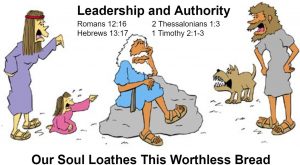
We complain about leadership or authority when we think that we could do a better job. When we have a high opinion of ourselves. Miriam and Korah were two who had high opinions of themselves. They both questioned why Moses should be the only leader. They were punished for their high-minded thinking with, for Miriam, leprosy and for Korah, death, his own and his family were swallowed up by the earth.
“Be of the same mind toward one another. Do not set your mind on high things, but associate with the humble. Do not be wise in your own opinion.” Romans 12:16
Instead of thinking more highly of themselves, Miriam and Korah could have better served themselves and their people by displaying love for Moses by being easy to lead and by showing Moses the respect he deserved.
“We are bound to thank God always for you, brethren, as it is fitting, because your faith grows exceedingly, and the love of every one of you all abounds toward each other.” 2 Thessalonians 1:3
Much like the God given role Moses played as the leader of the Israelites, we have elders who rule over us. Moses was not a highfalutin leader whose goal in life was to seek more power and more riches for himself. Moses was meek, humble. He did not even want to be a leader, but he took the job God gave him and served to the best of his ability. Our elders are the same. They do not take on the job for prestige or money. They realize that our souls are at stake as well as theirs. They do the best they can to guide and lead us as God would have them to. It is our job to make their job easier by respecting them and cooperating when they make difficult decisions.
“Obey those who rule over you, and be submissive, for they watch out for your souls, as those who must give account. Let them do so with joy and not with grief, for that would be unprofitable for you.” Hebrews 13:17
In much the same way as the elders, we are to be in submission to the rulers of our government. Not because they are godly or wise but because they are in authority. We should be respectful and cooperative. We are to pray for them. We should pray that through their leadership we may lead a quiet and peaceful life. That we are given the freedom to exhibit true godliness.
“Therefore, I exhort first of all that supplications, prayers, intercessions, and giving of thanks be made for all men, for kings and all who are in authority, that we may lead a quiet and peaceable life in all godliness and reverence. For this is good and acceptable in the sight of God our Savior.” 1 Timothy 2:1-3
Food and Water
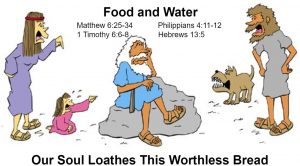
Food and water are a fundamental need for every human. The Israelites were used to the life they had in Egypt. They had grown up knowing how to survive with the food they had available. They had grown to love the food they had available. They could not understand how God would take care of all 1 million people out in the desert. How would they provide for their little ones, their elderly?
We have a little bit of understanding about this worry. When we experience food shortages and lack of water due to the storms that come through our area, we are concerned about where our next meal will come from. When the food supply is interrupted, it is hard to think of anything else.
God used this basic survival need to teach the Israelites, and through them teach us, that He would provide for them. He allowed them to get hungry and thirsty so they would know what being in want felt like. He did not starve them, but He let them hit close to rock bottom. They could have asked politely how they were going to eat but fear took over. They started murmuring. The murmur passed around the whole group until they were all in a frenzy about where they were going to get food. They knew they would not be able to provide it themselves. Instead of trusting in the One who liberated them from slavery and safely across the Red Sea, they looked to themselves and panicked, realizing they could not do the job.
God taught us through them that He would take care of us. Jesus taught in Matthew 6 to what extent He would take care of us. Trust is hard. Trust is necessary. Trusting God frees us up to expend our energy on more important things like being thankful and praising God.
“Therefore I say to you, do not worry about your life, what you will eat or what you will drink; nor about your body, what you will put on. Is not life more than food and the body more than clothing? Look at the birds of the air, for they neither sow nor reap nor gather into barns; yet your heavenly Father feeds them. Are you not of more value than they? Which of you by worrying can add one cubit to his stature?
“So why do you worry about clothing? Consider the lilies of the field, how they grow: they neither toil nor spin; and yet I say to you that even Solomon in all his glory was not arrayed like one of these. Now if God so clothes the grass of the field, which today is, and tomorrow is thrown into the oven, will He not much more clothe you, O you of little faith?
“Therefore do not worry, saying, ‘What shall we eat?’ or ‘What shall we drink?’ or ‘What shall we wear?’ For after all these things the Gentiles seek. For your heavenly Father knows that you need all these things. But seek first the kingdom of God and His righteousness, and all these things shall be added to you. Therefore do not worry about tomorrow, for tomorrow will worry about its own things. Sufficient for the day is its own trouble.” Matthew 6:25-34
Paul knew what it was like to be in need. He also knew what it was like to abound. He discusses abounding in the love of the brethren. He talks about the dear friends who had seen to it he had the necessities and more than the necessities as he labored for Christ’s sake. Yet, he learned regardless of his situation to be content.
“Not that I speak in regard to need, for I have learned in whatever state I am, to be content. I know how to be abased, and I know how to abound. Everywhere and in all things, I have learned both to be full and to be hungry, both to abound and to suffer need.” Philippians 4:11-12
Paul tells Timothy that contentment is a good thing. A woman who is not content makes all who are around miserable. Once she gets what she wants, she wants the next thing. She gets the latest phone and as soon as a new one comes out, that is what she wants. She gets a nice home and when she sees her friend get a newer one, that is what she wants. When we are around someone who is not content with what they have, it becomes apparent why God disapproves of this attitude so much. How much more inviting it is to be around someone who is content with what she has?
“Now godliness with contentment is great gain. For we brought nothing into this world, and it is certain we can carry nothing out. And having food and clothing, with these we shall be content.” 1 Timothy 6:6-8
Discontentment brings about covetousness. A discontent woman wants more and more. Like the song says, “Give us more and more and more”. We are told that covetousness is idolatry. While we consider ourselves past all the idol worship of days gone by, we are definitely susceptible to covetousness. There is no difference. The idol just takes on a different form. If an object or a desire gains a more prominent place in our hearts than God, we have become idol worshipers.
“Let your conduct be without covetousness; be content with such things as you have. For He Himself has said, ‘I will never leave you nor forsake you.'” Hebrews 13:5
Comfort and Safety
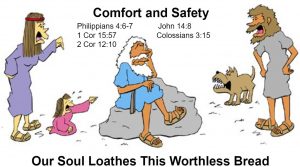
We are all concerned about our safety and comfort. No one wants to be unnecessarily put in a dangerous position or in a position where we are uncomfortable. The Israelites were no different. I would imagine that they expected everything to be rosy when they left Egypt. They had been promised a land of their own, a land flowing with milk and honey. When it did not work out the way they expected, took longer than they thought, was more dangerous than they had foreseen, they complained. God wants us to express ourselves to Him. He wants us to humbly realize that we can do nothing without Him. What He does not want is for us, like the Israelites, to murmur and complain about things. He does not want us spreading our discontent to others causing a mass mentality. He wants us to calmly make our requests known to Him.
“Be anxious for nothing, but in everything by prayer and supplication, with thanksgiving, let your requests be made known to God; and the peace of God, which surpasses all understanding, will guard your hearts and minds through Christ Jesus.” Philippians 4:6-7
One of the lessons the Israelites had to learn is that God is sufficient for us. If we are wise, we will learn from them and not have to learn the hard way, God is all we need. We do not need to do it ourselves. We do not need to gather with the masses to let our voice be heard. He wants us to trust Him and accept the situation we are in for what it is.
“Philip said to Him, “Lord, show us the Father, and it is sufficient for us.” John 14:8
Only when we put our trust in God, will we be victorious. We are told that we must join hand in hand with the world to create the kind of life we want. If we join with the world, the life we create will be without God. Our victory, the victory in Christ that leads to eternal life, comes only through Christ. Be thankful.
“But thanks be to God, who gives us the victory through our Lord Jesus Christ.” 1 Corinthians 15:57
While it is difficult to give up control, to walk a different path than our neighbors, those of us who have seen both sides, living with the world, living with Christ, can attest to the true peace. Peace that is in our hearts. Peace that cannot be attained through fighting and struggling in this world. Do we want the peace that comes from God? We must let Him rule. And always, show our thankfulness through actions, words, prayers.
“And let the peace of God rule in your hearts, to which also you were called in one body; and be thankful.” Colossians 3:15
Just as we talked about last week that we want to be an encouragement to our man so that he can confidently say when he is weak, he is strong, we want to look at the problems we face every day to become stronger. Not because we are doing it ourselves but because we are giving ourselves over to Christ.
“Therefore, I take pleasure in infirmities, in reproaches, in needs, in persecutions, in distresses, for Christ’s sake. For when I am weak, then I am strong.” 2 Corinthians 12:10
Conclusion
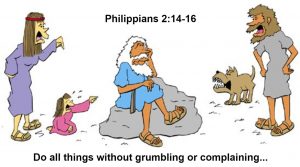
God was not upset that the Israelites were in need. He was not upset that they noticed they did not have enough food or water. He was upset that they complained. They murmured. They whined. God does not want us to complain either. He is not happy when we talk amongst ourselves about how difficult our lives are. He is not happy when we post on social media about all our problems. He wants us to become blameless and harmless. He wants us to shine as lights in the world. He wants us to hold fast to the word of life. He wants us to succeed and be able to rejoice when Christ returns.
“Do all things without complaining and disputing, that you may become blameless and harmless, children of God without fault in the midst of a crooked and perverse generation, among whom you shine as lights in the world, holding fast the word of life, so that I may rejoice in the day of Christ that I have not run in vain or labored in vain.” Philippians 2:14-16
“Our soul loathes this worthless bread.” That is what the Israelites said about the wonderful manna that God freely gave them every morning. They were so preoccupied with self that they did not see what God had done for them. Let us make sure to always look at what we have been given as a blessing and not turn around and disrespect the gift and the Giver by loathing it and considering it worthless.

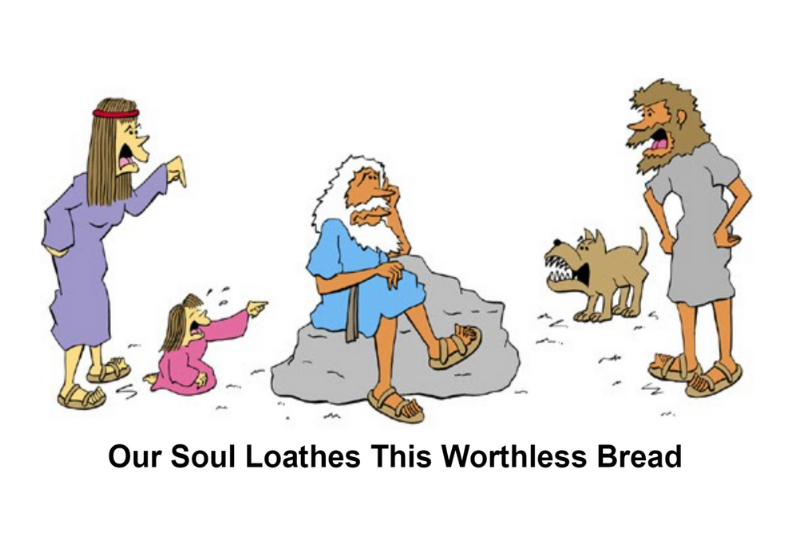

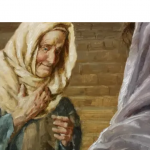
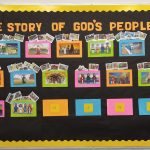
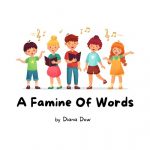

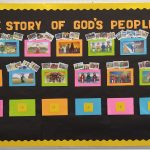
0 Comments